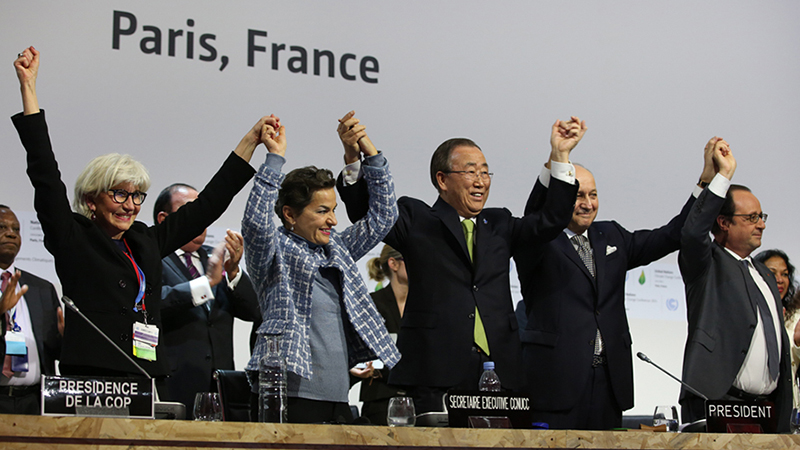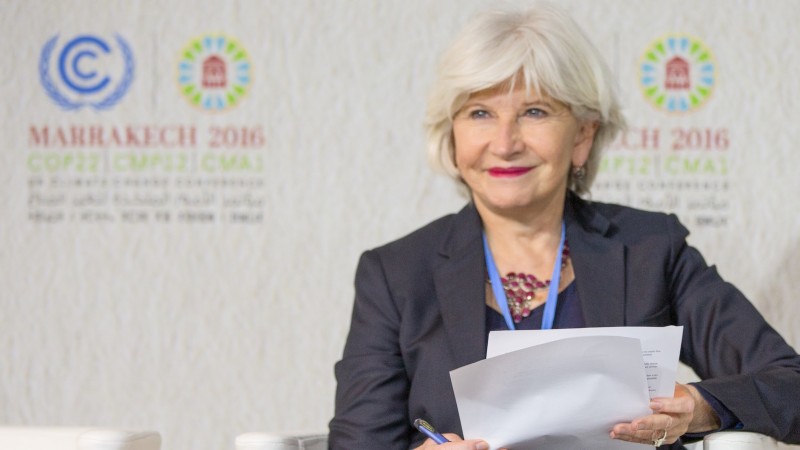Ed’s note: Laurence Tubiana announced on July 22 that she would end her bid to represent the leftist New Popular Front (NFP) as France’s new prime minister, after failing to gain the backing of all four parties in the coalition. In an open letter posted on social media, she said she would return to the struggles that have always been hers – “the social emergency and the climate emergency” which need to be tackled hand in hand with civil society playing a key role.
Veteran climate diplomat Laurence Tubiana is in contention to be France’s new prime minister, with three left-wing parties backing her as a compromise candidate following inconclusive legislative elections. But infighting among the leftist political coalition that won the most seats means she has yet to be confirmed as its official choice.
France’s Green Party (EELV), Socialist Party (PS) and Communist Party (PCF) have proposed Tubiana – a key figure in securing the Paris Agreement on climate change – for the leadership role, representing the New Popular Front (NFP) coalition of left-wing parties. She has no formal political affiliation.
The head of the PS, Olivier Faure, said Tubiana “completely corresponds to what we are promoting”, praising her as the “architect of COP21 [where the Paris Agreement was adopted in 2015], commissioner for the climate convention, economist and diplomat engaged in both the environmental and social fields”.
But the biggest member of the NFP alliance, hard-left party France Unbowed (La France insoumise, LFI), is opposed to Tubiana getting the job, as they fear she is too close to the current President Emmanuel Macron and his centrist Renaissance party. “If this is the profile our partners are working on, I’ll fall off my chair,” said LFI coordinator Manuel Bompard on Tuesday, adding the suggestion was “not serious”.
In the July 7 elections, which resulted in a surprise defeat for the far right, no block won a majority of seats in the French legislature, known as the National Assembly. Of the 577 seats, the NFP left-wing alliance won 182, President Macron’s centrist party 168 and Marine Le Pen’s far-right National Rally (RN) 143.
On Tuesday, French President Emmanuel Macron accepted the resignation of current Prime Minister Gabriel Attal, although he will lead a caretaker government with a limited mandate until a new government is named.
The choice of the new prime minister is ultimately up to President Macron, but in order to govern, the PM must have the support of a majority of National Assembly deputies.
The left-wing parties have been searching for a joint candidate and, after the LFI’s suggestion of Huguette Bello was rejected by the Socialists, Tubiana’s name was put forward. Faure said Tubiana had been consulted before the suggestion was made.
UK court ruling provides ammo for anti-fossil fuel lawyers worldwide
Tubiana, he said, is “someone who has strong convictions, who has never compromised. She has always been on that side [the left], she has never deviated. This is a demonstration of her ability to stand her ground.”
But according to French newspaper Le Monde, the LFI suspects she is too close to Macron. He twice offered her the job of ecological transition minister, which she declined, and she recently co-signed an editorial calling for the the left-wing block to reach out to Macron’s centrist party in order to govern.
Climate pedigree
Tubiana started out at the French National Institute for Agricultural Research before setting up and leading an NGO working on food security and the global environment called Solagral through the 1980s and 1990s.
In 1997, then French President Lionel Jospin of the Socialist Party appointed her as his environmental advisor until he stepped down in 2022.
Tubiana next founded an influential French think-tank called the Institute for Sustainable Development and International Relations (IDDRI) before re-entering government as France’s lead negotiator in the run up to COP21, at which the landmark Paris Agreement was signed.
Since then, she has been an official United Nations champion on climate action, as well as president and CEO of the European Climate Foundation (ECF), which funds green think-tanks and media outlets including Climate Home News.
Where East African oil pipeline meets sea, displaced farmers bemoan “bad deal” on compensation
In these roles, she has pushed for governments at UN climate summits to agree to phase out fossil fuels, and called carbon capture and storage a false solution to the fossil fuel industries’ emissions.
In 2018, Macron appointed her as a member of France’s official climate advisory body, the High Council on Climate Change.
The ECF has recently worked alongside the French and Kenyan governments looking into global green taxes that could fund climate action.

Laurence Tubiana (left) celebrates the signing of the Paris Agreement in 2015 (credit: IISD.ca/Kiara Worth)
Environmental lawyer Arnaud Gossement said Tubiana’s appointment as France’s prime minister would be “a really good idea” as she is “a recognised climate specialist”.
Florence Faucher, professor of political science at French university Sciences Po, told Climate Home that Tubiana’s appointment “would certainly be interesting” but “I really doubt it [will happen]”.
The leftist coalition has said it hopes to find agreement on a candidate soon, with the new National Assembly set to meet for the first time on Thursday. One way the matter could be settled is by holding a vote among the new left-wing deputies.
On Wednesday morning, EELV deputy Sandrine Rousseau told French TV: “The discussions are not over – we will find a solution.”
(Reporting by Joe Lo; editing by Megan Rowling)
